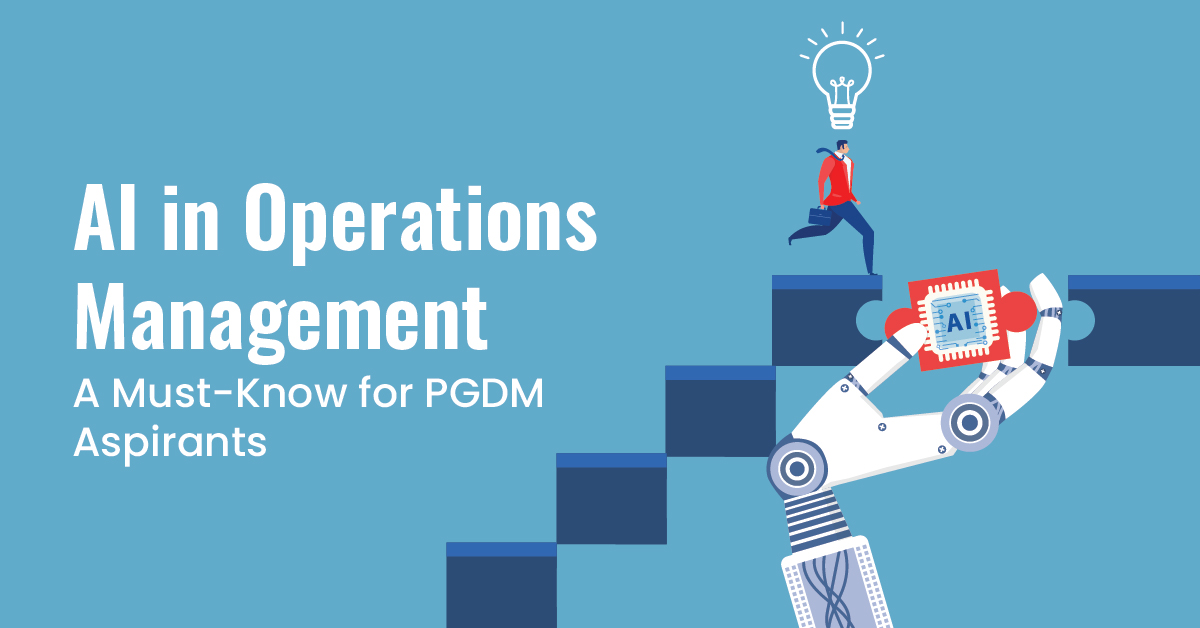A few years back, Operations Management was all about maximizing processes, minimizing costs, and effectively managing supply chains. That’s still the case, but 2025 has brought in a big game-changer—Artificial Intelligence (AI).
AI is more than a buzzword in the tech world; it’s redefining operations managers’ planning of production, managing inventory, quality control, and making key decisions. AI usage in operations can minimize forecasting errors by as much as 50%, logistics costs by 15%, and inventory levels by 35%, as reported by a 2024 McKinsey report.
Then what is this for PGDM students who aspire to have a career in Operations?
It means transformation. AI is now central to operations strategy, and managers who understand how to work with AI are the ones who will lead future-ready businesses. In this blog, we unpack how AI is reshaping Operations Management and what PGDM students must know to stay ahead.
2. The New Operations Landscape: Where AI Steps In
Operations today aren’t just about supply chains—they’re about intelligent systems, real-time data, and predictive models. AI is no longer an “add-on”; it’s woven into the very fabric of how operations are executed.
2.1 From Traditional Ops to AI-Driven Intelligence
Let’s compare how AI is changing the traditional roles in operations:
| Operations Area | Traditional Method | AI-Enhanced Approach |
| Inventory Management | Manual tracking and periodic audits | Real-time tracking and auto-replenishment |
| Demand Forecasting | Historical data, Excel spreadsheets | Predictive analytics using ML models |
| Quality Control | Human inspections, checklists | AI-powered vision systems with defect detection |
| Maintenance | Reactive maintenance post-failure | Predictive maintenance via IoT & AI |
| Logistics Optimization | Fixed routing, static delivery schedules | Dynamic routing with AI and traffic analytics |
These shifts mean that managers are now expected to use AI tools not just to monitor but to anticipate and act in real-time.
2.2 Key Applications of AI in Operations
A. Predictive Maintenance
Artificial Intelligence in operations can analyze machine sensor data to predict when equipment is likely to fail, allowing for timely servicing.
According to statistics, Predictive maintenance can reduce unplanned outages by up to 50% and maintenance costs by 10–40% (Deloitte, 2023).
B. Demand Forecasting
AI systems leverage external and internal data (like weather, market trends, and customer behavior) to fine-tune forecasts.
Guess what impact it created? Improved forecast accuracy leads to 30–50% less inventory holding cost (Emeritus Blog, 2025).
C. AI-Powered Quality Control
Machine vision systems detect flaws more accurately and at scale, ensuring better quality with minimal human error.
One of the use cases for the same is Tesla. It uses AI to inspect parts for micro-defects invisible to the human eye, reducing returns and increasing consistency.
D. Workflow Automation
AI tools automate repetitive tasks in order processing, scheduling, and compliance reporting.
For instance, Companies using robotic process automation (RPA) in operations report a 20–25% improvement in processing efficiency.
E. Real-Time Risk Management
AI analyzes global and local risks—from supply chain disruptions to compliance alerts—and proposes mitigation actions.
For example, IBM’s Watson Supply Chain flags supplier risks in real time, helping firms stay proactive instead of reactive.
3. The Skills Ops Recruiters Want in 2025
To succeed in this AI-integrated space, PGDM students need to focus on building a hybrid skill set that combines domain knowledge with tech fluency.
3.1 Data-Driven Decision Making
Employers want future ops managers who can:
- Interpret real-time dashboards from tools like Power BI, SAP, or Tableau
- Collaborate with data science teams to turn operational data into insights
- Use predictive models to inform decisions in procurement, production, or logistics
3.2 Technical Proficiency in Tools & Platforms
Not just that, recruiters look for individuals with working knowledge of:
- AI applications like IBM Watson, UiPath, Oracle SCM Cloud
- Forecasting software with ML capabilities
- RPA tools for supply chain automation
57% of companies report having already integrated AI into their operations and supply chains, according to PwC’s 2025 Digital Trends in Operations survey.
3.3 Strategic Agility
Today’s ops professionals are not just problem-solvers, but they are also opportunity spotters. This means:
- Being comfortable with digital transformation projects
- Leading cross-functional teams to implement AI-based solutions
- Understanding how AI aligns with broader business KPIs (cost, speed, quality)
4. Top Trends in AI-Driven Operations Management (2025 & Beyond)
Here are five trends PGDM students need to track:
4.1 Hyper-Automated Warehousing
AI + robotics are transforming warehouses into smart facilities, where picking, packing, and dispatching happen autonomously.
Here’s a case: Amazon’s AI-enabled fulfillment centers process more than 300 items per second using smart logistics.
4.2 Smart Inventory & Replenishment
Retail and manufacturing giants now use AI to predict stockouts and automate ordering.
Wondering what the result was? Reduced holding costs, fewer write-offs, and better shelf availability.
4.3 AI-Powered Sustainability
AI is helping companies reduce waste and carbon footprints by optimizing energy use and resource planning.
For instance, Unilever uses AI to cut energy consumption in factories by 15% annually.
4.4 Human-AI Collaboration
Rather than replacing managers, AI enhances decision-making. Future-ready ops professionals will know when to rely on data and when to trust instinct.
Here’s an expert insight: Gartner predicts that by 2026, 50% of supply chain decisions will be made in AI-human collaborative teams.
4.5 Explainable AI & Ethics
Companies are increasingly focused on using “explainable” AI models that promote transparency and fairness, which is an important topic for future ops leaders.
5. How a PGDM in Operations from FIIB Prepares You
At FIIB, the PGDM Course in Operations Management is tailored to equip students with the mindset, tools, and capabilities to lead in an AI-first world.
5.1 Industry-Focused Curriculum
Courses like “Digital Supply Chain,” “AI in Business,” and “Smart Operations Strategy” reflect current industry needs. Students explore real AI tools—not just theory.
5.2 Hands-on Learning with Real Tools
From using Tableau in supply chain simulations to working on AI-led forecasting projects with industry mentors, students apply what they learn in real business contexts.
5.3 Corporate Connect & Placement Opportunities
FIIB students gain access to internships and placement support in:
- Smart manufacturing firms
- Retail giants deploying AI
- Logistics companies using automation tools
Recent FIIB alumni have been placed as Business Operations Analysts, AI Strategy Associates, and Supply Chain Consultants.
Conclusion: For Future-Ready Operations Careers, AI is Non-Negotiable
AI is not merely a digital aid; it’s now a fundamental skill in operations management. The future is for professionals who will learn to balance data and instinct, automation and adaptability, and technology and human interaction.
Your capacity to comprehend, collaborate with, and manage AI-driven operations systems, as a PGDM candidate, will determine your professional trajectory for the coming decade.
FIIB’s PGDM in Operations Management helps you do exactly that—become a part of tomorrow’s operations positions, today.
Find out more about how FIIB trains students for AI-driven ops careers: www.fiib.edu.in

















Leave a comment